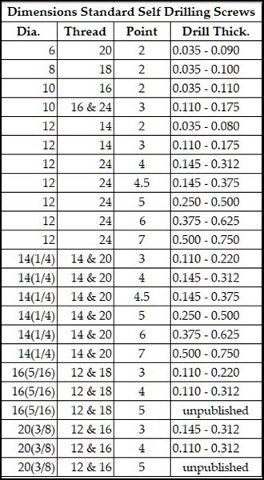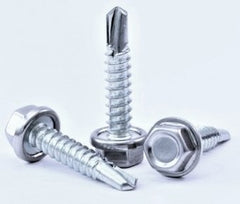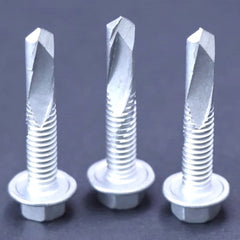Self-drilling screws are sometimes known by the trademarked brand name Tek® or Teks® Screws. While many people use that brand name for generic screws, it is still an active trademark. I personally think it’s become generic from lack of enforcement, but right now it’s valid.
The Teks® brand name refers to screws invented, patented, and trademarked in September 1963 by ITW Buildex (#0772092, last renewed 2014). The original screws were always hex heads with a high-hat (a taller head than normal to ensure excellent engagement with the installation tool) and serrated. Soon other variations followed (Pan, Flat, and Oval heads were the first to appear). The high-hats gave way to standard hex heads for uniform appearance, and the serrations went away on most sizes to save money. (One size the 10 x ¾ Serrated High-Hat remains popular to this day.)
Sadly, while ITW used to make most of their self-drilling screws in the USA they have sent most of it offshore. We have no problem with that, but we don’t think there’s any point in paying a lot more money for the same imported screws everyone else is selling – you’re only paying for the name and (in some instances) the coating. The ITW Teks® branded screws have a “BX” stamped on the head. We at Hardware Everywhere are thrilled to provide you Teks® brand drill screws if that’s what you want.
Self-drilling screws can be easily identified by the drill bit-shaped point of the screw and are designed for various applications, such as fastening metal to metal and metal to wood.
Self-drilling screws do not normally require a pilot hole, so don’t drill one. This significantly improves installation time and lowers labor cost and eliminates the need for additional drill bits. These extra functionality and cost-saving features make self-drilling screws the clear choice for metal building construction (and many other applications too).
When might you need a pilot hole? If you are going through two dissimilar materials such as wood to metal (or vice-versa). Keep in mind if you are attaching different types of materials (or different strengths of the same materials) a pilot hole may still be advisable to prevent “riding up” which is when the metal starts to ride the thread of the screw as it’s installed.
With self-drilling screws, wood needs to be pre-drilled so it doesn’t alter the drill-point’s ability to work.
Most self-drilling screws are either carbon steel (case hardened) or 410 Stainless Steel (also hardened). They are the most popular because they work well in most materials. Just remember dissimilar metals don’t mix well. We also have self-drilling screws available in 304 and 316 stainless but they don’t work well because they cannot be hardened – these almost all require a pilot-hole, so my question to you is WHY BOTHER? Get a regular tapping screw for a lot less money if you have to pre-drill anyway. How many of your vendors tell you to buy a cheaper product? 😊
Standard drill points are whole numbers between #1 and #5, and the amount of steel they can drill through increases as the number gets larger. There’s a table further down showing maximum drill capacity. There are points #4.5, #6, and #7 as well but they are almost all made to order.
|
|
MAX DRILL CAPACITY |
|
|
POINT |
Decimal |
Fraction |
|
2 |
0.090 |
3/32” |
|
3 |
0.175 |
3/16” |
|
4 |
0.312 |
5/16” |
|
4.5 |
0.375 |
3/8” |
|
5 |
0.500 |
1/2” |
|
6 |
0.625 |
5/8” |
|
7 |
0.750 |
3/4” |
Typically, most self-drilling screws are used in light gauge applications, but a #5 drill point can drill through and fasten up 1/2" of steel. Remember that all self-drilling screws are also self-tapping screws but all self-tappers are not self-drilling. Self-tapping screws tap their own threads but cannot drill through most metal and require a pilot hole. If you recollect, we wrote an article on self-drilling versus self-tapping previously. These screws are not interchangeable, and mixing the two can cause both headaches and failures in the field.
While we’re talking about self-drilling screws, let’s discuss Dril-Flex® Structural Drill Screws – please note the correct spelling of the name. Dril-Flex is a precision engineered product that was invented by my dear friend Gregg Melvin at Elco Construction Fasteners. Elco was recently purchased by DeWalt. And they say, “Dril-Flex Structural Screws are dual heat-treated self-drilling tapping screws that provide the strength, ductility and resistance to embrittlement required for critical applications. Lower-hardness load bearing area provides increased resistance to Hydrogen-Assisted Stress Corrosion Cracking when compared to case hardened fasteners” Many commonly call these screws Grade-5 self-drilling screws, which isn’t far off the mark. Hardware Everywhere can have custom made Dril-Flex style structural screws custom made for you in any size or point configuration right here in the good ole’ USA!
Another great DeWalt product they acquired from Elco is Bi-Flex® Structural Drill-Screws. They have high-strength, ductility, and reliability. And they are. As DeWalt says, “Immune to hydrogen assisted stress corrosion cracking (HASCC).” Picture it as a 300 series stainless screw from the halfway point to the head with a Dril-Flex® lower body and cutting point. By using it, you get much higher corrosion resistance compared with carbon steel and 410 series stainless steel fasteners and it’s also compatible with pressure treated lumber.
Available in a range of sizes (from #4 to 3/8” diameter), lengths (from ¼” to 8” long standard), head-styles (Hex, Pan, Flat, Oval, Modified Truss, Wafer, Bugle), and drives (Phillips, Square, Slotted, and 6-Lobe) self-drilling screws are handy and versatile.
- Be sure (as with any fastener) to choose the right size self-drilling screw to match the material(s) and thicknesses you are working with. Make sure that the screw’s drill point capacity exceeds the thickness of the material to be drilled. Failing to do so may result in burnt out or broken drilling tips, or the fastener may snap entirely.
- Power drills with adjustable clutch settings are suited for use with self-drilling screws. Avoid impact drivers, as hammering action generated by impact drills can cause metal dimpling or oil canning deformations on lightweight metal sheets.
- Do not over-tighten any screw, especially when fastening them into metal.
- Especially do not over-tighten any screw with an EPDM (or rubber) sealing washer! The washer should compress just enough to fill any uneven surface to provide a perfect seal. If the washers are over-compressed, the sheet panel may deform from over-tightening. Worse, the exposed portion of the washer will now be exposed to the sun and the elements, which reduces the lifespan of the EPDM considerably.
- When fastening screws onto hardened galvanized or structural steel, set your power drill’s clutch speed to around 1500 rpm, and apply steady, consistent, pressure throughout the process. Drill speed exceeding 2300 rpm or more can result in premature drill point wear or burnout, causing it fail to function or the heads to snap.
- Ultimately, your project is only as strong as its weakest fastener. Choose only quality self-drilling screws from Hardware Everywhere.

For the chart to the left, please note that #6 and #7 drill screw tips are made only to order and almost impossible to find in the USA due to lack of tooling. Finer threads will slightly reduce drilling capacity but also reduce riding up. There are some unusual diameters made by some manufacturers, but they fall in line on the cart between the sizes they reside. (Elco, for example, makes an 11/32 diameter for instance.)

Forged Point self-drilling screws (See the crimping at the tip and how the cutting edges are messy?). Most drill-screws are forged points. Performance of forged points screws is noticeably less than milled point. It’s not a capacity issue but a speed and smoothness issue.

Milled Point self-drilling screws (See the how sharp it is at the tip and how clean the edges are on these original Dril-Flex® Screws?). Performance of milled points screws is noticeably better than forged point. It’ll go in smoother, faster, and likely to outperform stated capacity. Sadly, hey are increasingly hard to find and far more expensive.

